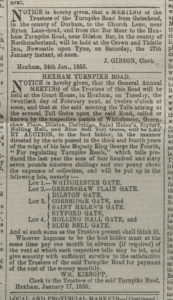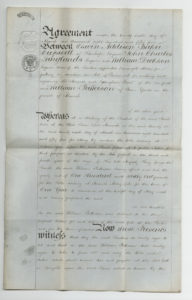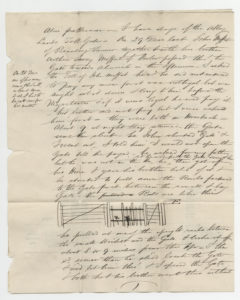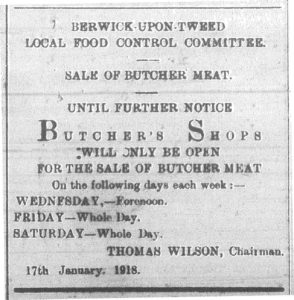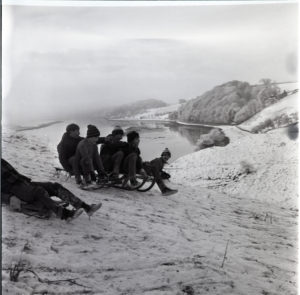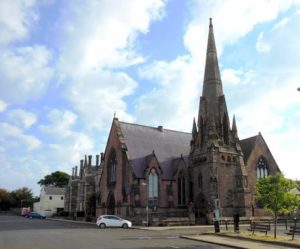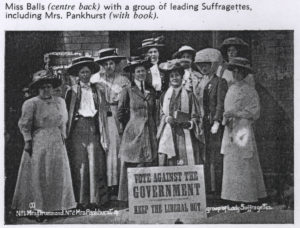
Recorded in 1975, Northumberland Archives holds a fascinating oral history recording of Suffragette Norah Balls. In the recording Norah discloses that she was just a young teenager when her mother first took her to a suffrage meeting. Her mother was a very strong-minded woman but not a keen suffragist so Norah was unsure why they both attended. Many years later in Tynemouth, Norah heard a small group of ladies talking about Women’s Suffrage. They were part of a new organisation which was going to be much livelier and insist on votes for women, as the previous attempts had no success. Norah signed her name to say she would be willing to become a member of the Women’s Social and Political Union. She began to take a very keen interest in it, and after some time, she was induced to go to a by-election. The Women’s Social and Political Union used to go to by-elections to talk to the people and to oppose the Liberal candidate, as the Liberals only paid lip-service to the movement. Norah went to Hawick Boroughs with several other women and their waggon and took the chair for the first time. She was very nervous standing up on the wagon in front of three or four hundred men but after her first appearance she attended quite a few by-elections.
In the north there were several very ardent suffragettes, who although they wouldn’t come out into the open and stand on street corners, were always behind the movement helping and encouraging. One was Lady Parsons, the wife of Sir Charles Parsons, and also Mrs Taylor of Chipchase Castle. Norah worked with her daughter Violet Taylor. At the South Shields by-election, she remembers that the Women’s Social and Political Union was made-up of a very interesting mix of people – rich and poor, and she found it quite remarkable how they worked together with one special aim. She remembered Emmeline Pankhurst and her daughter, Christabel, both coming to this by-election and Norah felt embarrassed as she was asked by Mrs Pankhurst to take the chair. She was terrified but no-one ever said no to that lady! Norah commented that two of Mrs Pankhurst’s daughters, Sylvia and Adela were very plain girls but good speakers. Her other daughter Christabel was much more alive and very ‘bonny’, always beautifully dressed and was an excellent speaker. Norah also stated that Mrs Pankhurst had wonderful eyes and a beautiful voice which she was able to easily project over a long distance. She recalled one incident when a man threw a cabbage at Mrs Pankhurst and she said ‘Oh the gentleman has lost his head!’. Normally when they went to the meetings, for example at Armstrong’s Works, the men would heckle them and they were very unoriginal with their comments. They would usually shout things such as ‘Go home and darn your husband’s socks!’ or ‘Go and mind the baby!’. On occasions missiles would be thrown and some things were quite heavy. There were however, many men who were in favour of suffrage for women.
No actual dates were given in the recording but Norah stated that it was decided that the Union should carry a petition to the House of Commons. This was to be delivered to Mr Asquith, who was a very hard man and against suffragettes. A number of people travelled from Newcastle and marched together to the Houses of Parliament. Norah remembered that she clasped her hands around the railings. The women refused to budge unless they saw Mr Asquith and he, of course, absolutely refused to see them and they were eventually arrested and taken to the police station. Norah recalled falling asleep in the station with her head in a coal bucket. They had to wait until Mr Pevick-Lawrence came to bail them out. (He later became Lord Pevick-Lawrence). They were given bail receipts and had to go to court the next morning but no charges were brought against them. They tried to deliver the petition on two further occasions and the third occasion resulted in Norah and a lady called Mrs Brown being pushed up against the railings. Apparently, a policeman was ‘rather rough’ with Mrs Brown so Norah battered his arm and was subsequently arrested for assault. In court the Magistrate looked at Norah as she stood in the dock and said, ‘This is a most dangerous woman’! Churchill who was Home Secretary at the time refused to let the women make themselves martyrs and so they were all released.
With the arrival of WW1, many suffragettes set the fight for the vote aside and took up war work. Norah started a canteen for the soldiers at Whitley Bay. She recalls that in the end the vote came quietly in the night and after that the suffragettes all went their separate ways.

